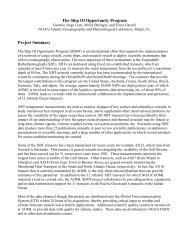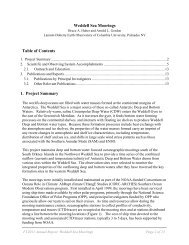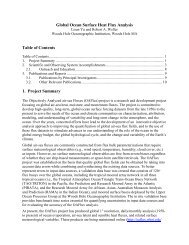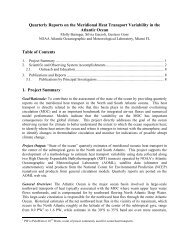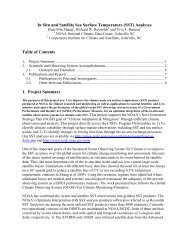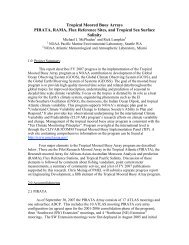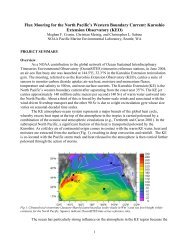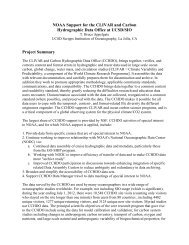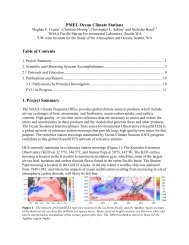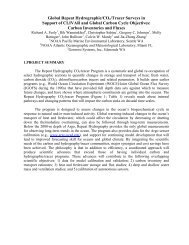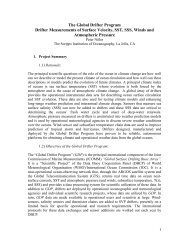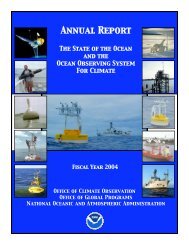GCOS Implementation Plan - WMO
GCOS Implementation Plan - WMO
GCOS Implementation Plan - WMO
You also want an ePaper? Increase the reach of your titles
YUMPU automatically turns print PDFs into web optimized ePapers that Google loves.
<strong>Implementation</strong> <strong>Plan</strong> for the Global Observing System for Climate in Support of the UNFCCC<br />
(2010 Update)<br />
4. Availability of Climate Data and Products<br />
4.1. High-Quality Climate Data: Exchange and Access<br />
Ensuring that high-quality climate data records are collected, retained and made accessible for use by<br />
current and future generations is a key objective of this <strong>Plan</strong>. As a result, investment in the data<br />
management and analysis components of the system is as important as the acquisition of the data.<br />
The <strong>Plan</strong> calls for internationally-recognised data centres (International Data Centres (IDCs)<br />
henceforth) 22 that include the World Data Centres and are highly effective in: (a) actively collecting<br />
data (other than the very large satellite datasets that are usually managed by the responsible space<br />
agency), (b) ensuring consistency and quality of the data, (c) ensuring that adequate metadata are<br />
provided, (d) being functional on a long-term basis, and (e) maintaining effective user access and<br />
data dissemination mechanisms. These IDCs perform a critical function and are supported on a<br />
voluntary basis by a number of Parties. Parties are encouraged to recognise the important role these<br />
Centres play and to ensure that they are effectively managed and well-supported on a long-term<br />
basis. IDCs are complemented by national data centres which have an important role in data<br />
archiving at the national level. The <strong>Plan</strong> seeks to strengthen existing IDCs and national data centres<br />
and to encourage commitments for new Centres so that there is appropriate infrastructure in place for<br />
all ECVs or groups of ECVs.<br />
The flow of data to the user community and to the IDCs is inadequate for many ECVs, especially for<br />
those of the terrestrial observing networks. Lack of national engagement and resources, restrictive<br />
data policies, and inadequate national and international data system (including telecommunication)<br />
infrastructure are the main causes of the inadequacy. The national reports to the UNFCCC on<br />
systematic observation should be taken as an opportunity to check whether these activities are<br />
undertaken to a satisfactory level.<br />
Key Need 10: Parties should ensure regular and timely submission of climate data to<br />
International Data Centres for all ECVs.<br />
In Decision 14/CP.4, the COP urged Parties to undertake free and unrestricted exchange of data to<br />
meet the needs of the Convention, recognizing the various policies on data exchange of relevant<br />
intergovernmental and international organizations. Yet, as the Second Adequacy Report and the IP-<br />
04 point out repeatedly with respect to almost all of the variables, the record of many Parties in<br />
providing full access to their data is poor. This <strong>Plan</strong> is based on the free and unrestricted exchange of<br />
all data and products and incorporates Actions to: (a) develop standards and procedures for metadata<br />
and its storage and exchange; (b) to ensure timely, efficient and quality-controlled flow of all ECV data<br />
to climate monitoring and analysis centres and international archives; and (c) to ensure that data<br />
policies facilitate the exchange and archiving of all ECV data and associated metadata.<br />
4.2. <strong>GCOS</strong> Climate Monitoring Principles<br />
The <strong>GCOS</strong> Climate Monitoring Principles (GCMPs) provide basic guidance regarding the planning,<br />
operation, and management of observing networks and systems, including satellites, to ensure that<br />
high-quality climate data are available and contribute to effective climate information. The GCMPs<br />
address issues such as the effective incorporation of new systems and networks; the importance of<br />
calibration, validation, and data homogeneity; the uninterrupted operation of individual stations and<br />
systems; the importance of additional observations in data-poor regions and regions sensitive to<br />
change; and the crucial importance of data management systems that facilitate access, use, and<br />
interpretation of the data. These principles have been adopted or agreed by the UNFCCC, <strong>WMO</strong>, the<br />
Committee on Earth Observation Satellites (CEOS), and other bodies. The implementation Actions<br />
now call on all data providers to adhere to the GCMPs and to initiate effective programmes of data<br />
quality control. When calibrating observing systems, traceability to SI standards should be ensured<br />
where possible.<br />
Key Need 11: Parties need to ensure that their climate-observing activities that contribute to<br />
<strong>GCOS</strong> adhere to the <strong>GCOS</strong> Climate Monitoring Principles.<br />
22 International Data Centres are responsible for monitoring, product preparation and dissemination as well as archiving.<br />
9



